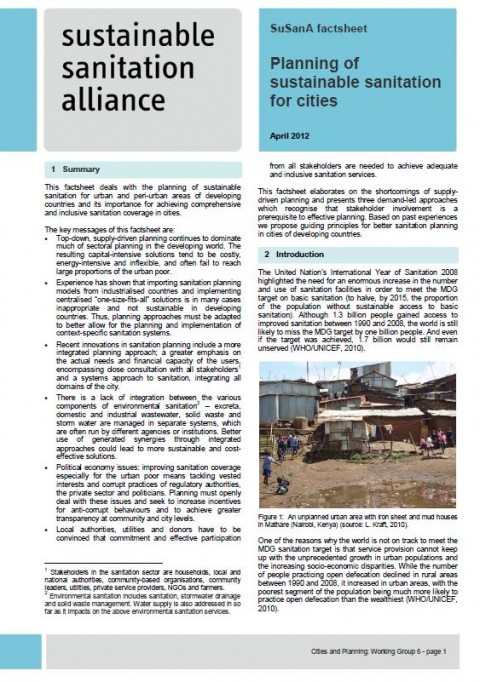This factsheet deals with the planning of sustainable sanitation for urban and peri-urban areas of developing countries and its importance for achieving comprehensive and inclusive sanitation coverage in cities.
The key messages of this factsheet are:
· Top-down, supply-driven planning continues to dominate much of sectoral planning in the developing world. The resulting capital-intensive solutions tend to be costly, energy-intensive and inflexible, and often fail to reach large proportions of the urban poor.
· Experience has shown that importing sanitation planning models from industrialised countries and implementing centralised “one-size-fits-all” solutions is in many cases inappropriate and not sustainable in developing countries. Thus, planning approaches must be adapted to better allow for the planning and implementation of context-specific sanitation systems.
· Recent innovations in sanitation planning include a more integrated planning approach; a greater emphasis on the actual needs and financial capacity of the users, encompassing close consultation with all stakeholders and a systems approach to sanitation, integrating all
domains of the city.
· There is a lack of integration between the various components of environmental sanitation2 – excreta, domestic and industrial wastewater, solid waste and storm water are managed in separate systems, which are often run by different agencies or institutions. Better use of generated synergies through integrated approaches could lead to more sustainable and costeffective solutions.
· Political economy issues: improving sanitation coverage especially for the urban poor means tackling vested interests and corrupt practices of regulatory authorities, the private sector and politicians. Planning must openly deal with these issues and seek to increase incentives for anti-corrupt behaviours and to achieve greater transparency at community and city levels.
· Local authorities, utilities and donors have to be convinced that commitment and effective participation from all stakeholders are needed to achieve adequate and inclusive sanitation services.
This factsheet elaborates on the shortcomings of supply driven planning and presents three demand-led approaches which recognise that stakeholder involvement is a prerequisite to effective planning. Based on past experiences we propose guiding principles for better sanitation planning
in cities of developing countries.
Bibliographic information
Lüthi, C., Lehn, H., Norström, A., Panesar, A., Rüd, S., Saywell, D., Verhagen, J., Ulrich, L., Ingle, R. (2012).
Planning of sustainable sanitation for cities Factsheet of Working Group 6 Sustainable Sanitation Alliance (SuSanA)
Filter / Tags
Publications by SuSanACities (WG6)Publications by SuSanAFactsheets and policy briefsEnglish
Downloads
Planning of sustainable sanitation for cities
Download
Type: application/pdf
Size: 0.43 MB

Published in: 2012
Pages: 0
Publisher:
Sustainable Sanitation Alliance (SuSanA)
Author(s):
Lüthi, C., Lehn, H., Norström, A., Panesar, A., Rüd, S., Saywell, D., Verhagen, J., Ulrich, L., Ingle, R.
Uploaded by:

